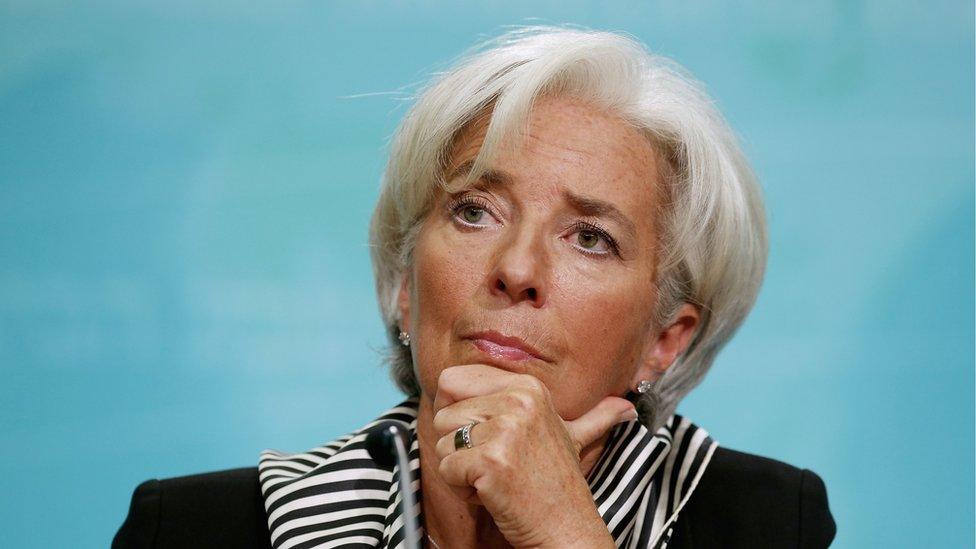Khashoggi affair: Will it reshape Middle East politics?
- Published
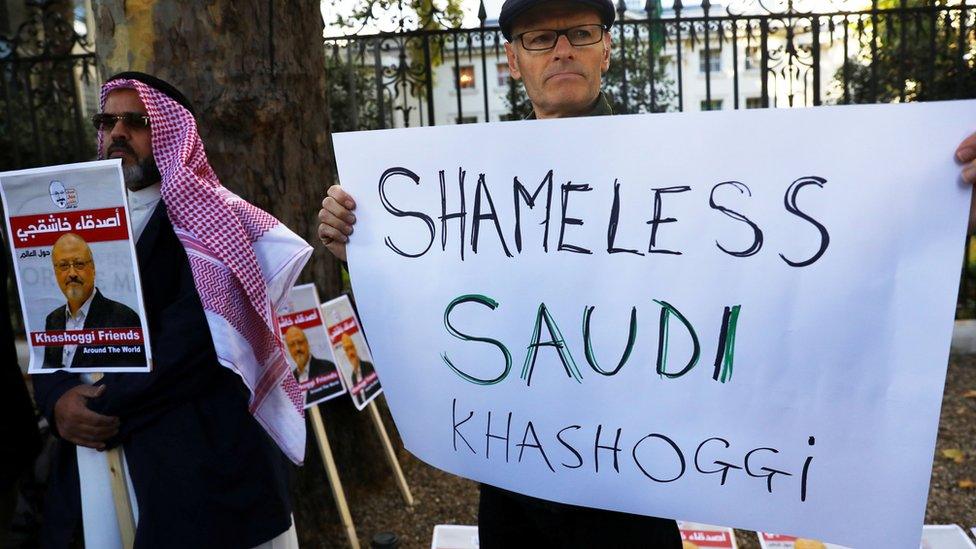
The disappearance of Jamal Khashoggi has led to anti-Saudi protests around the world
The murder of the Saudi journalist Jamal Khashoggi hasn't just greatly complicated relations between the kingdom and Turkey.
It has caused a major headache for all those Western governments who have long been close political and business allies of the Saudi regime, perhaps revealing the true nature of the crown prince who aspires to lead his country for decades to come.
This is especially the case in the United States. While the Trump administration's basic instinct appears to be to hope that this whole sorry episode blows over as soon as possible, there are calls from senior figures on Capitol Hill - joined by many Saudi experts among the think-tank community - for a fundamental reassessment of US-Saudi ties.
While there is much more to be revealed about the exact circumstances of his death and the disposal of his remains, the essential question - who actually ordered his killing - may never be known.
All the evidence so far suggests it came right from the top in the Saudi regime - from Crown Prince Mohammed bin Salman (MBS) himself.
MBS controls many of the levers of power in the kingdom. Many of those now arrested for the crime work under him, and Saudi experts believe it is almost impossible to imagine this murder taking place without the order coming down from on high.
Much will depend upon how much evidence there may be about MBS's direct involvement.
Jamal Khashoggi and how Saudi critics keep going missing
What more do the Turks have up their sleeve? Turkish President Recep Tayyip Erdogan is playing the Saudi crown prince like a cat playing with a mouse. He knows a lot more than he is letting on - at least in public - but quite how much is uncertain.
He is drawing out this crisis - pursuing what legal options there are - while keeping up the sense of drama and keeping the spotlight firmly fixed on MBS.
Turkey and Saudi Arabia are both significant regional actors, both Sunni countries aspiring to a wider leadership role in the broader Middle East.
This rivalry means that their interests do not coincide and President Erdogan intends to make as much of the Saudi crown prince's difficulties as he can.
For Mr Erdogan, it helps to bolster his own domestic constituency and may help to open the way to improved relations with Washington.
The skilful use of pressure, especially if relieved at the right moment, may even secure a significant slice of Saudi investment or economic aid to help bolster Turkey's flagging economy.
The Americans have a very different problem, one of balancing interests and values.
For Washington this goes way beyond arms sales. They are just one element of a long-standing structural relationship between the US and the Saudis which is based upon a shared perception of the strategic importance of the region and a joint belief in the importance of maintaining stability.
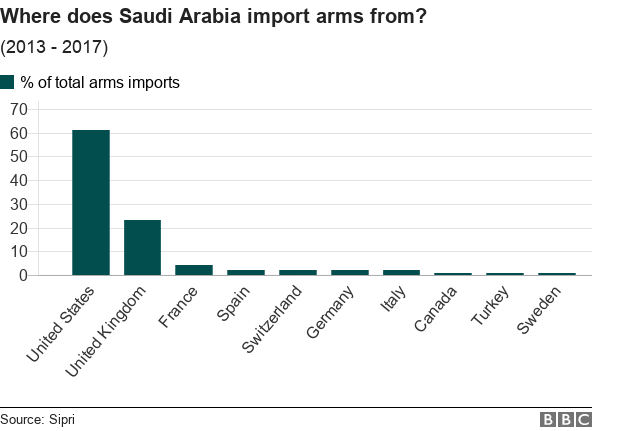
Oil was the central factor in the relationship. And while the US itself is now far less dependent on Saudi crude, the kingdom's importance as an energy supplier makes its stability of fundamental strategic importance.
The Saudi-US relationship has endured despite significant periods of difficulty, not least the Saudis' efforts to export a conservative and fundamentalist view of Islam.
There have been ups and downs in this relationship but the arrival of MBS at the helm in Saudi Arabia has been a very mixed blessing. The initial enthusiasm for his domestic reform programme tended to over-shadow the many negative aspects of his policies.
But no longer. He has been responsible for the effort to isolate Qatar; the temporary kidnapping of the Lebanese prime minister; an unnecessary spat with Canada over human rights; and most importantly the unleashing of the Saudi-led offensive in Yemen.
This has caused countless civilian casualties and threatens to bring large swathes of the country to the point of starvation. Viewed from Washington, MBS's policies are delivering the very opposite of stability.
Things are made even worse because the Trump administration has placed all its policy eggs in the MBS basket.
It is looking to him to help facilitate its three key policy goals in the region. Firstly, to assist in the battle against terror; secondly to deliver up the Palestinians as part of the Trump peace plan to resolve the Israel-Palestinian dispute; thirdly, and most important of all, Saudi Arabia is seen as a critical ally in Mr Trump's efforts to isolate Iran.
This is why the Trump administration must be hoping that this will all blow over. A fundamental reassessment of Washington's relationship with Saudi Arabia may not happen on Mr Trump's watch, but it may not be able to be postponed indefinitely. Of course Mr Trump may take one line but Congress may take another.
Might the Saudis come up with some way of constraining the errant crown prince? The glitzy economic forum last week presided over by a confident-looking MBS didn't suggest that he was yet in any great domestic trouble.
Russia has signalled that it is waiting on the sidelines, urging that the official Saudi line on the Khashoggi affair be believed.
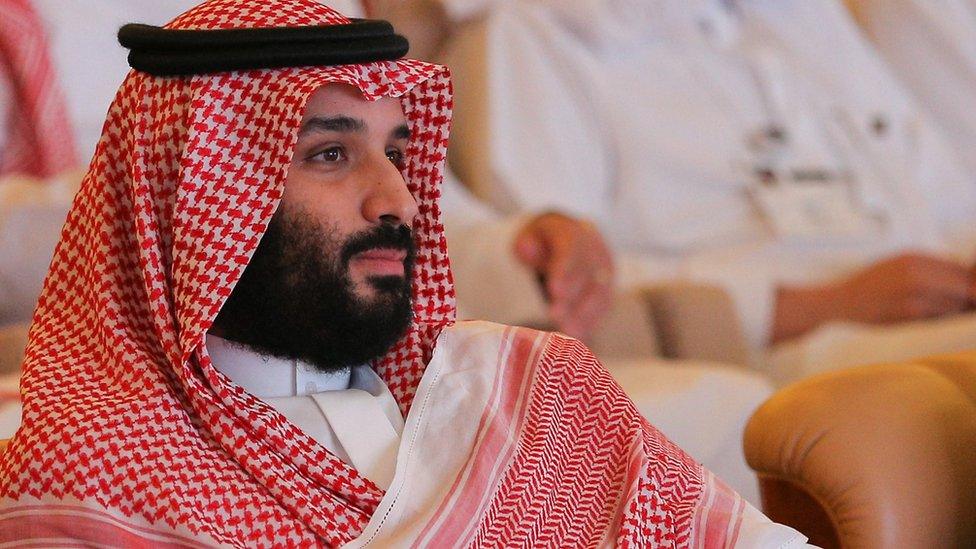
Saudi Arabia says Crown Prince Mohammed bin Salman had nothing to do with the killing
Perhaps Moscow is hoping for future arms sales. President Vladimir Putin is, of course, eager to bolster his own country's interests in the region.
For the West, arms sales are a double-edged sword. Yes, a long-term refusal to supply Saudi Arabia would indeed cost jobs but the Saudis cannot simply or quickly move from Western armaments to Russian or Chinese suppliers.
Western equipment, munitions, trainers and advisers keep the Saudi air force flying over Yemen.
Western leverage is greater than many imagine. The question is are they willing to use it and, in particular, is the Trump administration likely to take a lead?
Even Washington's allies appear deeply divided. German Chancellor Angela Merkel has been virtually alone in suspending arms sales to Saudi Arabia pending some clarification, as she put it, on "the background of this horrible crime".
Her approach prompted French President Emmanuel Macron to suggest that a halt to arms sales was "pure demagoguery".
If Western allies of Saudi Arabia are unable to act in concert, then a fundamental reappraisal of Saudi ties is unlikely to happen until there is a significant change of political outlook in the White House.
- Published24 October 2018
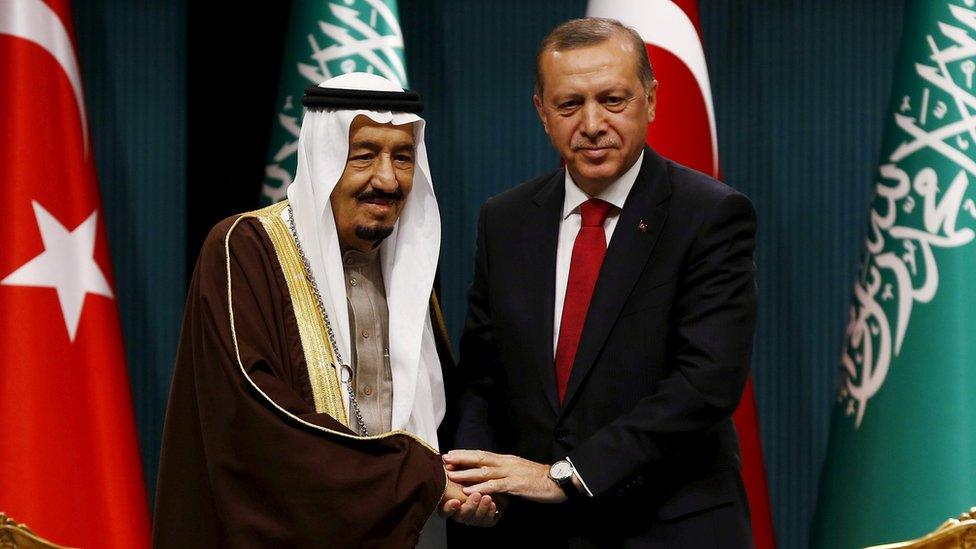
- Published22 October 2018
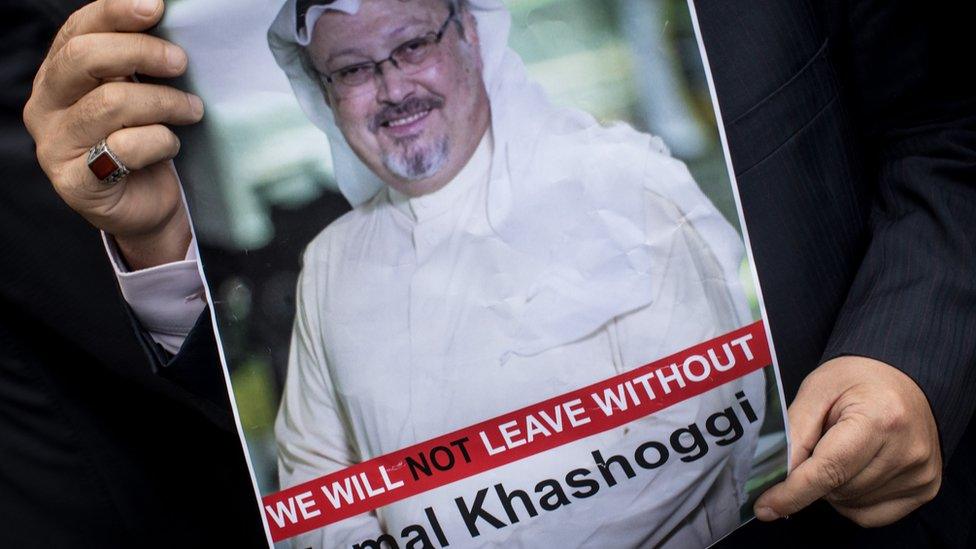
- Published19 October 2018

- Published18 October 2018
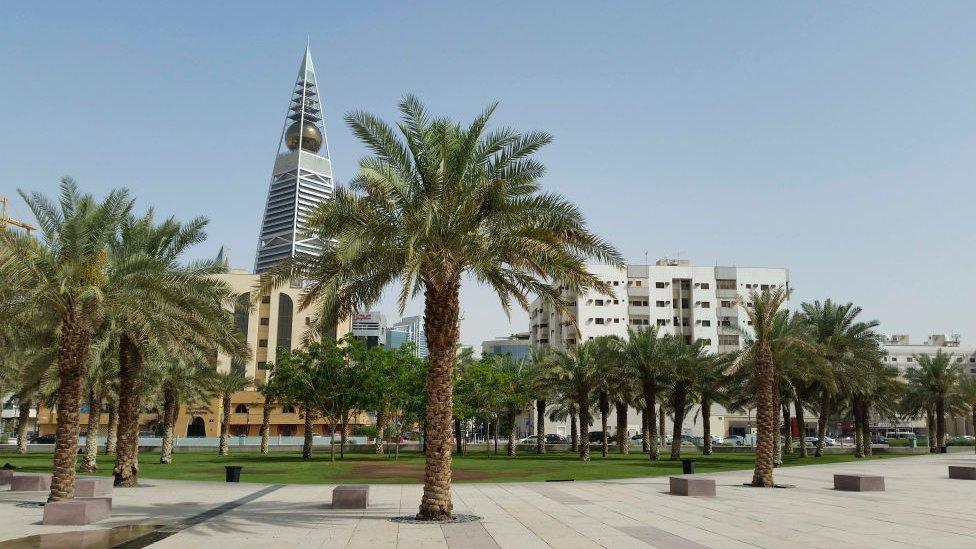
- Published17 October 2018
